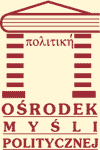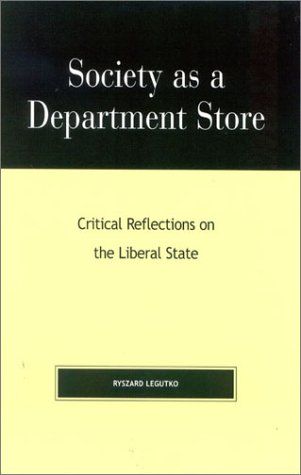

This is an American edition of articles (formerly published in various periodicals) by Ryszard Legutko, President of the Centre for Political Thought.
Society as a Department Store
Lexington Books
Hardcover
$60, ISBN: 0739103717, July 2002, 200pp.
In his most recent book, Society as a Department Store (Lexington Books, 2002), the Polish philosopher Ryszard Legutko discusses the dilemma of Western intellectuals who sympathized with socialism's professed ethics but now are faced, on the one hand, with a bankrupt idea, and on the other with a liberalism driven to extremes. This dilemma is felt acutely in Central and Eastern Europe, where Western ideological fantasies such as Nazism and Marxism had been tested before. After fifty years of totalitarian rule, the societies in that region needed a period of healing to mend social bonds and reestablish values. However, as Western-inspired nihilism spreads and social solidarity breaks down, some of Central and Eastern Europe's former dissidents feel let down by the liberalism they once championed.
Table of ContentsIntroduction 1
1 Society as a Department Store 5
2 The Trouble with Toleration 21
3 Plato's Two Democracies 35
4 On Postmodern Liberal Conservatism 51
5 Was Hayek an Instrumentalist? 71
6 The Free Market in a Republic 89
7 On Communist Illusion 103
8 Intellectuals and Communism 115
9 Sir Isaiah Berlin: A Naive Liberal 135
About the Author 141
This is an American edition of our book Polish Anti-Communism and Its Intellectual Traditions. An Anthology, ed. by B.Szlachta, Krakow: Centre for Political Thought, 2001.
Polish Perspectives on Communism
Edited by Bogdan Szlachta
Lexington Books$60, ISBN: 0-7391-0765-8, November 2003, 188pp
Lexington Books
4501 Forbes Blvd., Suite 200
Lanham, MD 20706
http://www.lexingtonbooks.comWhen in the summer of 1920, the Red Army invaded newly independent Poland hoping to use it as a base for carrying out communist revolutions in the West, it met with unexpected resistance not only from the propertied class, but also from peasants and workers. The Poles had a remarkably clear understanding of communism's implications for freedom and human rights. Contributors to Polish Perspectives on Communism accurately grasped, decades before it was actually tried, what communism would mean in practice. These authors-some writing in the mid-1800s-understood the consequences of abolishing property, as preached by the communists, and of their rejection of religion and the rule of law. They anticipated the gruesome features of Leninism-Stalinism long before the collapse of the Soviet Union opened the eyes of its Western admirers.
The authors in this anthology dispel the illusion that if communism failed in Russia it was due to an accident of history, having been tried in the wrong country and implemented by incompetent leaders. The evidence presented here should demonstrate that its failure was not only inevitable, but also anticipated long before it occurred.
List of Contributors
Józef Maria Bochenski, Konstanty Grzybowski, Ignacy Czuma, Ignacy Daszynski, Henryk Dembinski, Roman Dmowski, Józef Goluchowski, Wladyslaw Leopold Jaworski, Walerian Kalinka, Henryk Kamienski, Adolf Kliszewicz, Zygmunt Krasinski, Adam Krzyzanowski, Jan Kucharzewski, Stanislaw Marian Kurtzeba, Boleslaw Limanowski, Marian Massonius, Ignacy Hugo Matuszewski, Jan Parandowski, Józef Pastuszka, Pawel Chosciak Popiel, Jan Kanty Rostworowski, Zdzislaw Stahl, Wiktor Sukiennicki, Antoni Maurycy Szymanski, Leon Wasilewski, Stefan Wyszynski, Marian Zdziechowski, and Ferdynand ZweigAbout the Author
Bogdan Szlachta teaches political science at the Jagellonian University in Krakow, POLAND.
[ Strona główna | Zarząd i Komitet Honorowy | Programy | Publikacje ]
[ Artykuły | Szkoły letnie i zimowe | Konferencje i debaty publiczne ]
[ Seminaria | Aktualności i plany | Sponsorzy | Partnerzy i linki ]
[ Klasycy myśli politycznej | Strona Krakowska ]
[ OMP poleca | Wspieraj OMP | Wyszukiwarka ]
[ Sklepik OMP ]
E-mail - omp@omp.org.pl
© 2003 Ośrodek Myśli Politycznej

